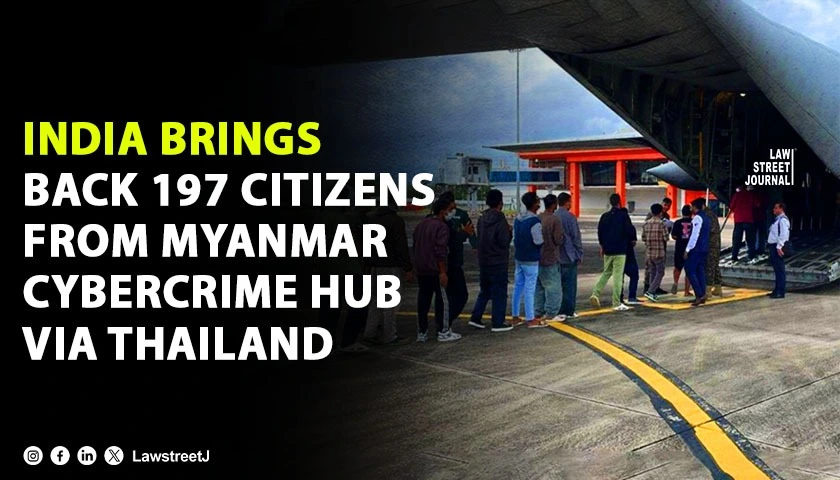New Delhi: India repatriated 197 citizens on 10 November 2025 after their escape from cybercrime centres in Myanmar and subsequent refuge in Thailand. The operation, carried out by the Indian Air Force in coordination with Thai authorities, marks the second phase of evacuations. Earlier in the week, 270 Indian nationals were brought back under a similar mission. The group had been working in cyber scam centres in Myanmar’s Myawaddy township, with many held inside the KK Park compound. KK Park, situated near the Thai border in Kayin State, has been identified as a hub for cyber fraud networks, illegal gambling operations, and trafficking rings. Reports indicate that more than 1,500 individuals from 28 countries had been confined inside the compound, where many were forced into online fraud activities.
A crackdown launched by Myanmar’s military in late October triggered a mass escape from these facilities. Hundreds crossed the border into Thailand, including Indian nationals who entered illegally while trying to flee forced labour and exploitative conditions. Thai authorities detained them in Mae Sot, a border town in Tak province, until diplomatic arrangements for their return could be finalised. The Indian Embassy in Thailand, working with the Ministry of External Affairs, set up a coordinated multi-agency response. Two Indian Air Force C-130J aircraft were deployed to carry out the evacuation, reflecting both the urgency of the situation and the scale of the humanitarian effort.
Legal Framework and Bilateral Coordination
Thai Prime Minister Anutin Charnvirakul supervised the evacuation at Mae Sot and met Indian Ambassador Nagesh Singh. Both governments reaffirmed their commitment to combating transnational crimes, including cyber fraud networks and trafficking groups operating across the region. In a formal statement, the Indian Embassy highlighted the importance of cooperation between law enforcement and immigration authorities in both countries. The repatriation falls under obligations laid out in the United Nations Convention against Transnational Organized Crime and its Trafficking in Persons Protocol. India and Thailand are signatories to these instruments, which establish standards for victim protection, cross-border cooperation, and prosecution of those involved in organised criminal activity.
Indian authorities have also initiated investigations under domestic laws, including the Immoral Traffic (Prevention) Act, 1956 and the Information Technology Act, 2000. Early findings point to recruitment schemes that lured victims through fraudulent overseas job advertisements circulated on social media and messaging platforms. Officials have stated that tracing the recruiters and intermediaries remains a top priority in ongoing inquiries. The Indian Embassy in Thailand has issued a public advisory urging citizens to verify job offers abroad and avoid unregulated recruitment channels. Work is underway between the Ministry of External Affairs and state governments to support the returning individuals. Assistance will include legal aid, counselling, and reintegration measures.
The latest evacuation comes amid broader regional scrutiny of cybercrime syndicates in Southeast Asia. Scam compounds in countries such as Cambodia and Laos have been dismantled in recent months, prompting discussions about a collective response within ASEAN to digital fraud and trafficking networks.
India’s recent operations illustrate its focus on protecting citizens abroad, particularly in cases involving organised criminal activity and human rights concerns. The MEA has reiterated its commitment to strengthening bilateral processes to reduce the risk of exploitation of Indian nationals in overseas employment markets. Authorities are expected to pursue action against recruitment agents and intermediaries operating within India and neighbouring countries. With 467 citizens repatriated within one week, the government has signalled a coordinated and determined approach to addressing transnational crime and supporting victims of such networks.




!['Relationship may not remain consensual for all time to come,' SC declines to quash rape FIR [Read Order]](/secure/uploads/2024/03/lj_9511_e86e4d76-2cf9-4fad-ab23-adf90aea64fa.webp)








